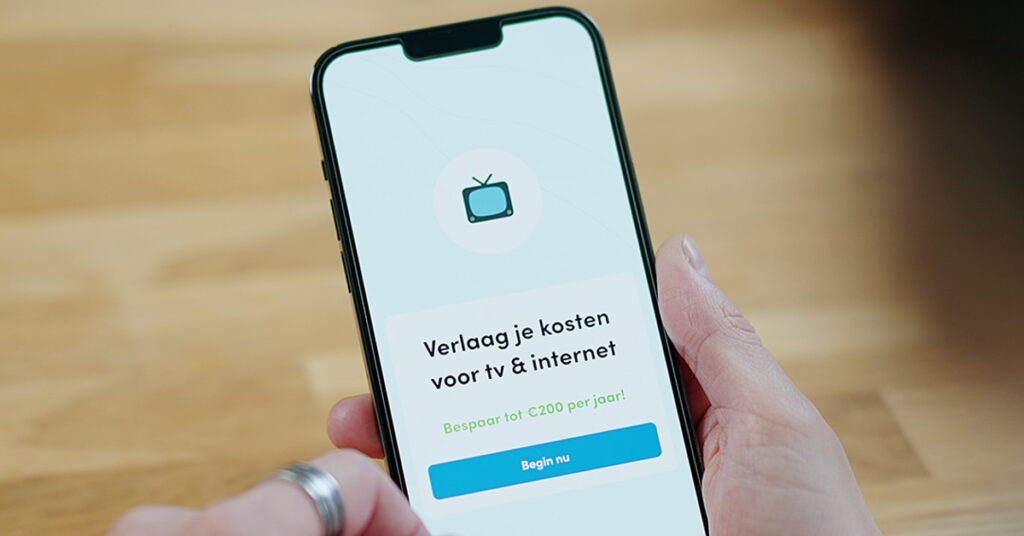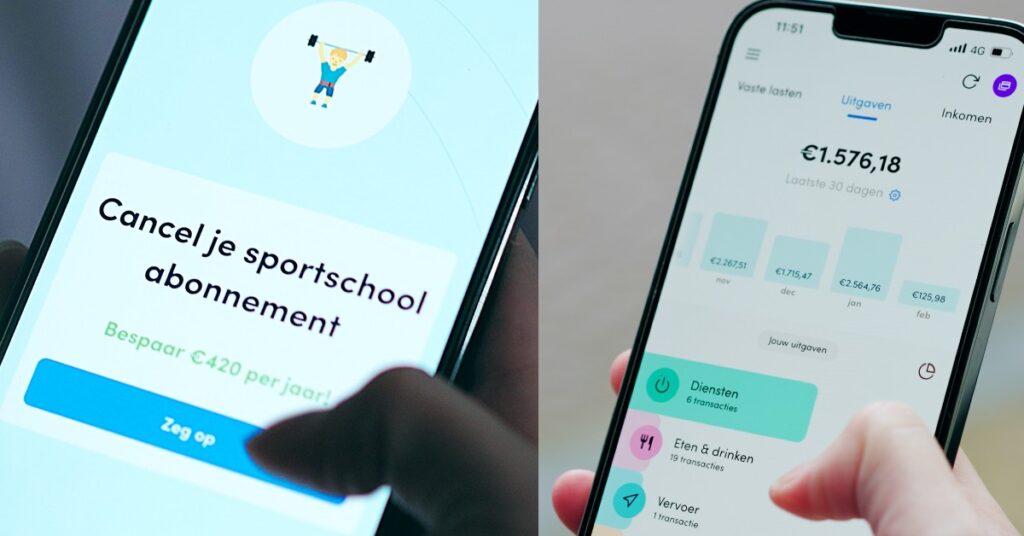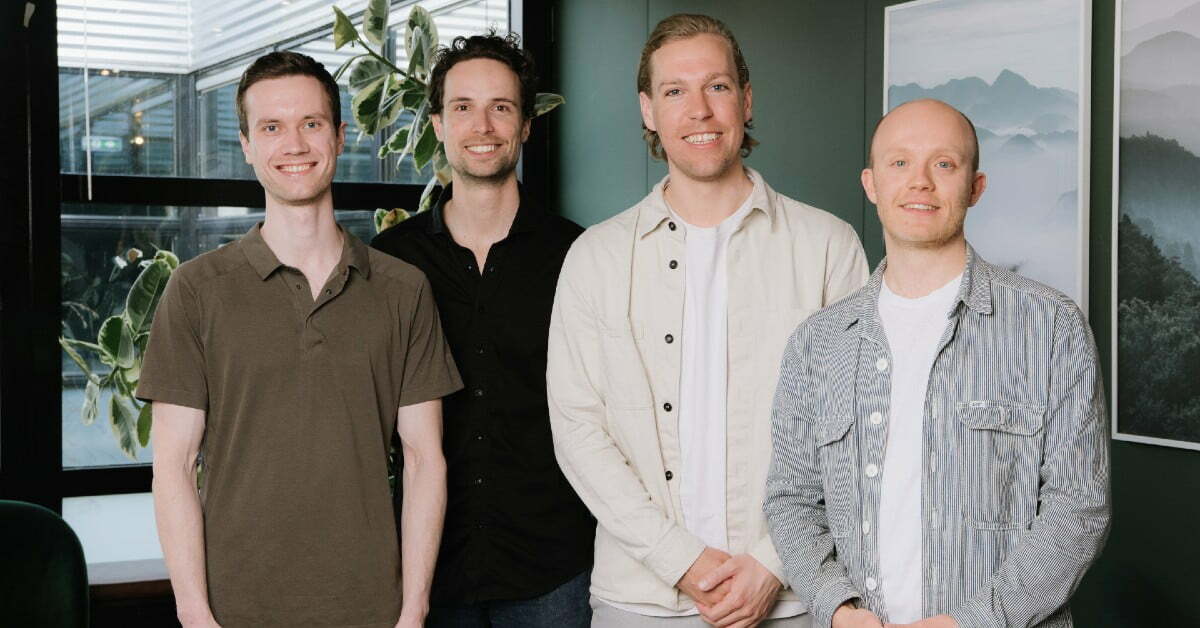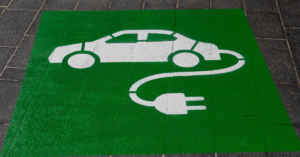From left: Wouter Florijn, Joran Iedema, David Knap, and David Schogt | Image Credit: Techleap.nl
Money has emerged as one of the common sources of stress among adults around the world. According to the American Psychological Association (APA), 72 per cent of American adults report feeling stressed about money, including worrying about paying rent or feeling stressed by debt. In Europe, one estimate shows that around 250 million people experience stress due to money worries.
There is one app that wants to take these worries away from Europeans struggling from money-induced stress. Called Dyme, the app made by an Amsterdam-based startup founded by David Knap, David Schogt, Joran Iedema, and Wouter Florijn wants to take care of financial worries of Europeans in general and Dutch people in particular.
Has the Dutch workforce mastered all digital skills? Find out
“4 out of 5 Dutch people regularly worry about money,” the startup says on its about page. It further notes that prolonged exposure to money stress has been found to lower IQ by 14 points. “In the Netherlands alone, people have 14 subscriptions on average,” says Joran Iedema, one of the co-founders of Dyme. He says people are getting more and more subscriptions and are getting confused by the payment model and automatic debit from their accounts.
Lack of overview of payment
In 2018, a research by ING shows that European consumers are spending on an average 5 per cent of their earnings on subscriptions. It estimated people spending about €130 per month for subscription services such as music, video, sports, or food. The research also showed Europeans spending €350B on these types of purchases every year.
Iedema says the consumer subscription apps market has grown by 100 per cent each year over the past five years. As a result, he sees people losing overview of what they are actually paying for. This problem is so real that Netflix announced plans to “automatically cancel accounts” that have been inactive for long periods of time.
The increase in subscription, Iedema says, was the first major factor behind the creation of Dyme. The second and a more recent phenomenon is the growth in inflation, which has led to increase in household bills, whether its internet, energy, insurance contracts, etc.
With Dyme, Iedema says, they are trying to tackle these two problems that have become an increasing cause of financial worry for Dutch people as well as Europeans. Iedema further explains that the app simply works by connecting all of their financial accounts, be it credit card or current account, and the app then shows all the payments being done through these accounts on a recurring basis.
“So, you get a really clear overview of both your subscriptions and your household bills,” Iedema says.
However, Dyme does not just show an holistic view of your spending habit but is also capable of taking action on your behalf. The co-founder of Dyme tells Silicon Canals that the app is capable of cancelling your subscriptions that you no longer want and can also detect if you are paying more for utilities like energy, insurance, internet, et cetera.
Negotiating a better deal for its users

The ability to offer a holistic view of your expenses may not sound like a game changer and the co-founders of Dyme are acutely aware of this. So, Dyme is now transitioning to become more than a cash book app. Iedema says that they are preparing to drop the “cash book” branding of its website altogether. It instead wants to be the app through which users get an overall view of their expenses and then get better deals on some of the contracts.
Before we get to how it does this, it is important to understand that Dyme does all this under Europe’s payment service directive (PSD). The PSD requires all European banks to provide their data to the customers so they can use it with third party apps like Dyme. It also has a licence from the Dutch central bank to provide the service anywhere in Europe.
This means Dyme users can login with their bank account similar to logging in to a service with your Facebook or Google account. Once you login, Dyme is able to pull all your transaction data using your bank’s API and the intelligent algorithms then do the work of finding out transactions related to subscription, utility bills, etc. The data is then enriched with additional metadata before being presented to the user.
Once you see your expenses through a clear, clutter-free lens, Dyme then tries to help fix the leak in your expenses. The app first looks at what you are paying for an utility, say electricity, and then it uses a “combination of advanced technologies” to detect what will be the best contract for you.
Iedema says this feature is not entirely automated and the company employs human experts who look through the fineprint of contract change. He further adds that Dyme is able to make these changes to contracts on behalf of its users thanks to the transaction history offered by the bank.
He says the app is able to see the price for a utility paid by the user over a period of 12 months and can suitably offer negotiated rates. The app is also able to factor in things like “what kind of household you have” to make a good estimate of your spending and the right pricing for your utility spending.
Iedema acknowledges that there are a lot of apps that can give users insights about their spending. Dyme, on the other hand, wants to stand apart from this crowd by being able to “take care of” its users’ spending habits and help lower their cost.
A European solution to money woes

This unique pitch seems to be working with 5,00,000 people using the Dyme app right now. Iedema says that 80 per cent of its users are in the Netherlands while the remaining 20 per cent of its users are in the United Kingdom. Iedema says the goal for Dyme is to become an European solution and it aims to grow much bigger in the next few quarters.
This begins by Dyme doubling down on its reach in the UK market and it is looking to introduce its full suite of service soon. Iedema estimates a potential market of 70 million people in the UK. After building its strength in the UK, Dyme wants to expand to markets like Germany, Spain, and France. It also has plans to expand to the US and has already done a test there.
Iedema also says Dyme has a “good unit economics” despite the growth it is seeing right now. He says the company is at a place where it does not need to raise any additional funding, but to expand to the UK, it does plan to raise later this year or the beginning of next year.
Rise is entrepreneurial learning
Dyme is one of the nine scaleups to participate in Techleap.nl’s Rise programme this year as part of batch 7. Iedema says he was intrigued to sign up for Rise since it allowed him the opportunity to learn from other entrepreneurs and experts who have gone through a similar phase of growth like Dyme.
“I think [Rise is] much more valuable than learning about business frameworks or methods of working, just learning from people who’ve experienced things firsthand,” Iedema says.
Iedema further says the Rise programme is of high quality and the opportunity to interact with experts and other co-founders is one of the reasons he joined the programme. Like many founders who participate in the Rise programme, Iedema also says the opportunity to explore shared experiences was one of the highlights for him.
“One of the biggest learnings and something we also saw with other startups is that when you transition from a company of just a handful of people to a larger company, it’s really important to have a clear long term vision,” he says. “An idea of where you want to go both from a product perspective, as well as from a marketing perspective.”
He adds that the Rise programme has helped him build a clear long term vision for Dyme and the learnings are now serving as a framework for all of its decision making. He concludes by saying that Dyme’s success is proportional to its goal of helping people not to worry about financial problems.
A growth mentality driven by purpose
Dyme’s purpose is well established and it wants its users to not only reach financial independence but also worry less about their money. In essence, it wants to help people in Europe reach a qualitative life and remove stress caused by concerns around their spending.
It also has an ambitious goal of reaching 10 million users in Europe in the next five years. In order to reach that milestone, Dyme is actively hiring across a number of engineering roles. “We are looking for a good infrastructure engineer at this moment,” Iedema says.
As Iedema and Dyme take their success in the Netherlands and try to replicate it in the UK and other markets, one of the challenges will be dealing with regulation and API access. However, the app solves a problem that is commonly impacting lives of many people around the world and that alone could drive many people to sign up for its service.
Catch our interview with Paul Down, Head of Sales at Intigriti.









